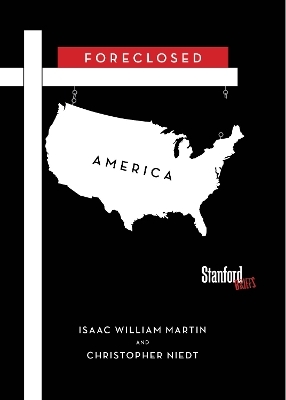
Foreclosed America
Stanford University Press (Verlag)
978-0-8047-9513-5 (ISBN)
From 2007 to 2012, almost five percent of American adults—about ten million people—lost their homes because they could not make mortgage payments. The scale of this home mortgage crisis is unprecedented—and it's not over. Foreclosures still displace more American homeowners every year than at any time before the twenty-first century. The dispossession and forced displacement of American families affects their health, educational success, and access to jobs. It continues to block any real recovery in the hardest-hit communities.
While we now know a lot about how this crisis affected the global economy, we still know very little about how it affected the people who lost their homes. Foreclosed America offers the first representative portrait of those people—who they are, how and where they live after losing their homes, and what they have to say about their finances, their neighborhoods, and American politics. It is a sobering picture of Americans down on their luck, and of a crisis that is testing American democracy.
Isaac William Martin is Professor of Sociology at the University of California, San Diego. Christopher Niedt is Associate Professor of Sociology at Hofstra University.
Contents and Abstracts1Ten million people chapter abstractThis chapter describes the mortgage foreclosure crisis from the standpoint of mortgage borrowers. It begins with an overview of the typical foreclosure process. It narrates how deregulation of mortgage lending and secondary mortgage markets led to a bubble, and then to the historic crash in 2007. It reviews existing research on the crisis and notes the absence of studies concerned with the people who lost their homes. It also introduces the National Suburban Poll, a survey data set that permits a representative overview of these dispossessed Americans.
2Who are the dispossessed Americans? chapter abstractThis chapter describes the people who lost homes because they could not pay their mortgages between 2007 and 2012. Younger homeowners, parents of young children, and people of color are overrepresented among them, but the typical adult who lost a home, like the typical person who did not, is a white person in early middle age with some college education and no children. What they have in common is bad luck and financial hardship. People who lost homes in the financial crisis have lower incomes, less stable finances, and more anxiety about their finances than otherwise identical people who did not lose homes in the crisis. They are more likely to be divorced or unemployed. Statistical models and personal narratives suggest that among people who were financially vulnerable to losing a home in the crisis years, all it took was bad luck to push them over the brink.
3Communities in crisis chapter abstractThis chapter describes the living arrangements and neighborhoods of individuals who lost their homes in the crisis. Most of them live in suburbs close to where they work. They generally have not moved far, and a quarter of them are even living in the same neighborhoods where they lived when they lost their homes. But their present housing arrangements are more precarious. Most are renting or living in shared housing. Many have doubled up at least temporarily by moving in with kin, friends, or roommates. They report big problems in their neighborhoods, from unemployment and unaffordable housing to crime, drugs, and violence. Their former neighbors—people who say that they know a neighbor who lost a home—are more likely to report abandoned or run-down homes as a big neighborhood problem.
4Disenfranchised and disillusioned chapter abstractThis chapter argues that the policy response to the foreclosure crisis has ignored the needs of dispossessed Americans because they are not a powerful voting bloc. They are less likely to stay registered and less likely to vote than other Americans, because losing a home makes it hard to stay registered to vote and hard to maintain the relationships that turn people out to the polls on election day. The dispossessed and the other adults in their households are also disillusioned with politics. They think government should do more to reduce economic inequalities, but they do not have confidence that it will. The lack of confidence in government may reflect their experiences of the crisis: federal policy responses focused on restoring housing markets to functioning, but have done little to redress the suffering of those who lost their homes when those markets failed.
| Erscheint lt. Verlag | 1.4.2015 |
|---|---|
| Zusatzinfo | 22 tables, 14 figures |
| Verlagsort | Palo Alto |
| Sprache | englisch |
| Maße | 127 x 203 mm |
| Gewicht | 118 g |
| Themenwelt | Sozialwissenschaften ► Soziologie ► Allgemeine Soziologie |
| Sozialwissenschaften ► Soziologie ► Makrosoziologie | |
| Wirtschaft ► Betriebswirtschaft / Management ► Finanzierung | |
| Betriebswirtschaft / Management ► Spezielle Betriebswirtschaftslehre ► Bankbetriebslehre | |
| ISBN-10 | 0-8047-9513-4 / 0804795134 |
| ISBN-13 | 978-0-8047-9513-5 / 9780804795135 |
| Zustand | Neuware |
| Haben Sie eine Frage zum Produkt? |
aus dem Bereich


